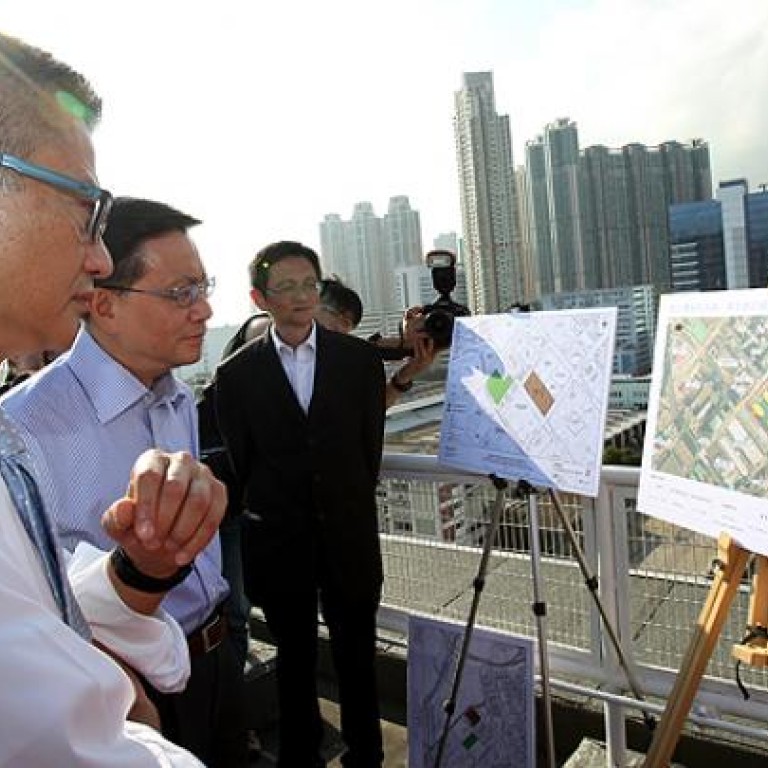
Military sites in range to ease Hong Kong housing crisis
Development chief admits that government could consider using former Hong Kong barracks and up to 13 other sites under the control of the PLA
The government is eyeing up military sites as it searches for land to ease the acute demand for housing, the development chief admitted on Wednesday.
Paul Chan Mo-po said the government was "working on" the idea, but did not give details.
He was speaking to legislators a day after the reported that land occupied by private clubs whose leases were up for renewal was also being looked at, along with school and community sites.
After the handover, the People's Liberation Army took 14 sites comprising 2,571 hectares and the Hong Kong government 25 comprising 139 hectares.
Independent lawmaker Lam Tai-fai had asked Chan if the government would consider Osborn Barracks in Kowloon Tong - now held by the PLA - for flats instead of a neighbouring site sought by Baptist University to develop a Chinese medicine teaching hospital.
"We are, in fact, working on Lam's suggestion," Chan said. Central government approval would be needed for the use of military land, except former garrison sites already under Hong Kong government control.
When asked later if other PLA sites would be considered, he said all options were possible. The Development Bureau said the government would not rule out any means of increasing land supply, but it had no definite plan for the barracks.
A source familiar with the situation said it would be hard to take back the PLA sites without the central government's approval, but said the bureau was reviewing its own sites. Under Article 13 of the Garrison Law, the PLA sites will be returned to the Hong Kong government only when Beijing deems that they are not necessary for defence.
Prime sites held by the PLA include the 10-hectare Osborn Barracks, which could accommodate 1,000 large flats valued at HK$20 billion, and the 11-hectare Gun Club Hill Barracks in Tsim Sha Tsui. Most of the 25 former military sites in the local government's hands have already been used, leaving eight either vacant or under short-term tenancies.
Three are in prime districts in Ho Man Tin, Kai Tak and Tuen Mun, currently used for sports activities, car parking, government storage and camping.
The colonial administration had already looked at their potential for flats. It found over 3,000 homes could be built at the former Perowne Barracks and Gordon Hard barracks in Tuen Mun, and 182 at the former Dills Corner Camp in Kwu Tung.
Military commentator Ma Ding-shing said use of the PLA sites was feasible. "I think the central government would negotiate if there was a serious need to build on those sites," Ma said.
"Placing soldiers in Hong Kong is not a military target of the central government. The likelihood of using these facilities to suppress Hongkongers or to defend [the city] from invaders is very low." But Macau-based military expert Anthony Wong Tung said it would not be easy, as the central government needed a land reserve for military use.
A PLA garrison spokesman said it had used all military sites in accordance with its responsibilities for the city's defence.
Lawmaker and former secretary for security Regina Ip Lau Suk-yee said the government would have to obtain the consent of the Central Military Commission to take back PLA land.
"If [Chan] is not familiar with the background, he'd better not comment," she said.
A spokesman for Chief Executive Leung Chun-ying's office was unable to say whether the government would talk to Beijing about releasing the PLA sites.
Meanwhile, in a written reply to a question from Civic Party lawmaker Ronny Tong Ka-wah, Chan said there was no timetable for reviewing the small-house policy in the New Territories.
This was because the issue was complicated and it would not produce much land in the short term.


